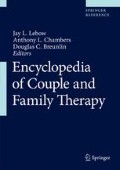Access this chapter
Tax calculation will be finalised at checkout
Purchases are for personal use only
References
Eldridge, K. A., & Christensen, A. (2002). Demand-withdraw communication during couple conflict: A review and analysis. In P. Noller & J. A. Feeney (Eds.), Understanding marriage: Developments in the study of couple interaction (pp. 289–322). Cambridge, MA: Cambridge University Press.
Elliott, R., Watson, J. C., Goldman, R. N., & Greenberg, L. S. (2004). Learning emotion-focused therapy: The process-experiential approach to change. Washington, DC: American Psychological Association.
Goldman, R. N., & Greenberg, L. S. (2007). Integrating love and power in emotion-focused couple therapy. European Psychotherapy, 7(1), 117–135.
Goldman, R. N., & Greenberg, L. (2013). Working with identity and self-soothing in emotion-focused therapy for couples. Family Process, 52(1), 62–82.
Greenberg, L. S., & Goldman, R. N. (2008). Emotion-focused couples therapy: The dynamics of emotion, love, and power. Washington, DC: American Psychological Association.
Meneses, C. W., & Greenberg, L. S. (2011). The construction of a model of the process of couples’ forgiveness in emotion-focused therapy for couples. Journal of Marital and Family Therapy, 37(4), 491–502.
Rothbart, M. K., & Derryberry, D. (1981). Development of individual differences in temperament. In M. E. Lamb & A. L. Brown (Eds.), Advances in developmental psychology (Vol. 1). Hillsdale: Erlbaum.
Shapero, B. G., Abramson, L. Y., & Alloy, L. B. (2016). Emotional reactivity and internalizing symptoms: Moderating role of emotion regulation. Cognitive Therapy and Research, 40(3), 328–340. https://doi.org/10.1007/s10608-015-9722-4.
Author information
Authors and Affiliations
Corresponding author
Editor information
Editors and Affiliations
Section Editor information
Rights and permissions
Copyright information
© 2019 Springer Nature Switzerland AG
About this entry
Cite this entry
Seiter, N., Smith, A.D., Quirk, K. (2019). Emotional Reactivity in Emotion-Focused Couple Therapy. In: Lebow, J.L., Chambers, A.L., Breunlin, D.C. (eds) Encyclopedia of Couple and Family Therapy. Springer, Cham. https://doi.org/10.1007/978-3-319-49425-8_176
Download citation
DOI: https://doi.org/10.1007/978-3-319-49425-8_176
Published:
Publisher Name: Springer, Cham
Print ISBN: 978-3-319-49423-4
Online ISBN: 978-3-319-49425-8
eBook Packages: Behavioral Science and PsychologyReference Module Humanities and Social SciencesReference Module Business, Economics and Social Sciences

